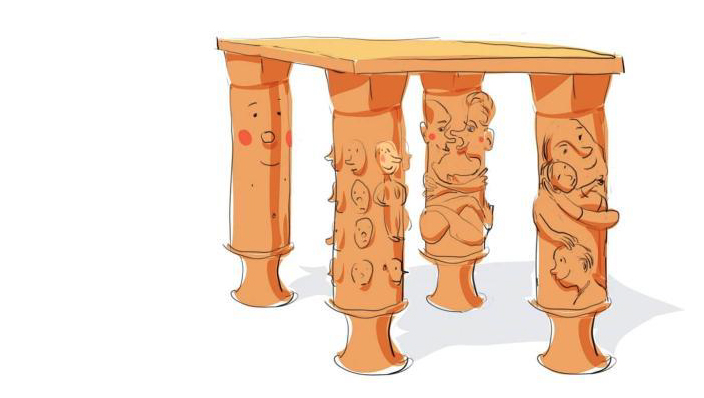Parents of small children and balance in life: Model of four table legs

You can examine your life by dividing it into four sections that are like four table legs:
I myself
When children are young, it is important to take care of your own well-being, that is, the “I myself” table leg. We also need time only for ourselves. As you run the day-to-day life, you do not take time for yourself as something else is always more important. Even a small amount of time recharges your batteries and helps you cope as a parent.
Consider the following:
- How are you?
- How do you charge your batteries being yourself?
- Are you satisfied with yourself?
- Are you happy?
- How well do you take care of yourself
- Do you have private time?
- What is particularly good about your life right now?
Partnership
Do you have a good friend, relative or spouse who listens and supports? If you have a spouse, the relationship may be put to a test when children are small. It is often difficult to find time with the partner. You should set aside time to care for your relationship, but it can be done in the middle of the day with small gestures. Tell your partner good things that you value and admire in them every day. Also, clearly express your wishes and needs. Do things that make your partner happy. Try to resolve conflicts constructively.
Consider the following:
- What is particularly good about your life right now?
- How does friendship and equality work in your relationship?
- Are you significant to your partner in a special way?
- How satisfied are you with your relationship?
- Are you satisfied with the sexuality in your relationship?
Parenting
When children are small, life consists mostly of parenting. Especially the stay-at-home parent may experience parenting as their only role, often accompanied by performance pressures.
Consider the following:
- How satisfied are you as a parent?
- What brings you joy in your parenting?
- Do you have the strength to bear the responsibilities and duties of parenting?
- If your family has two parents, do you plan and execute parenting issues together as a team of as two equal adults?
- If you are solely responsible for parenting, how do you take care of your own coping?
Sense of community
We cannot cope without other people. Colleagues help meet the need for sense of community. Stay-at-home parent who cares for small children at home often longs for their own adult community. Friends, acquaintances and relatives in the same situation may act as a safety net. However, everyone has a very unique need for relationships outside home. For example, more introvert individuals often need less human contact than the more extrovert ones. These personal differences in needs should be taken into account in family life and allow enough room for each of the different wishes and needs.
Consider the following:
- Do you have adult friends with whom you can accomplish other aspects about yourself than parenting or relationship?
- Are you satisfied with your current support networks?
- What is particularly good about your life right now?
If you want to meet new people in the same situation, you can find them in, for example:
- Guidance centre
- Open day-care, your child’s day-care
- Parish
- Family cafés of the Mannerheim League for Child Welfare
- Various hobby groups
- Various online groups
Author: Parenting Experts, the Family Federation of Finland
